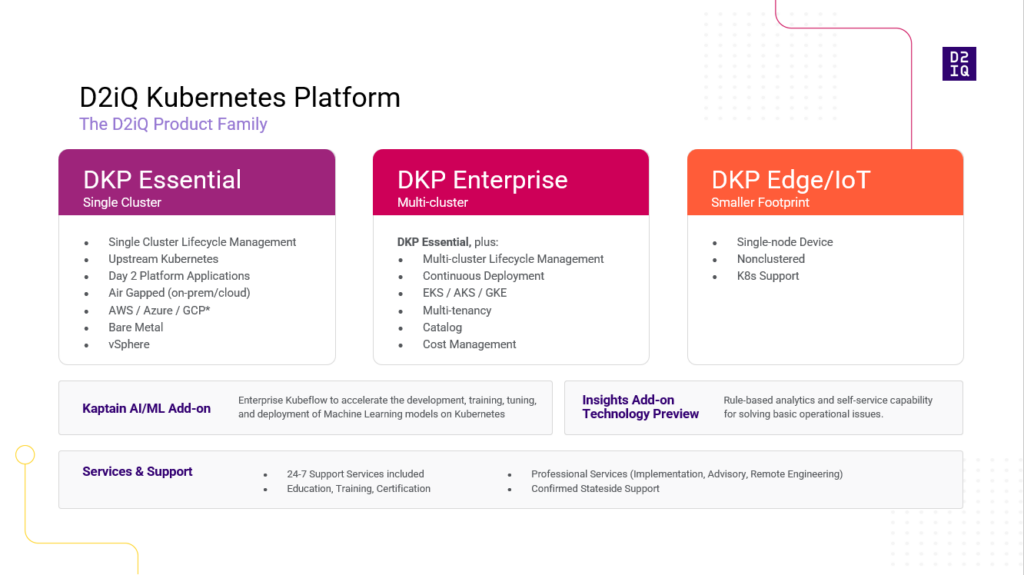D2iQ Extends Reach of Kubernetes Management Platform
D2iQ has updated its centralized Kubernetes cluster management platform to make it possible to configure and deploy applications per cluster in a multi-cluster environment.
In addition, version 2.3 of the D2iQ Kubernetes Platform (DKP) adds support for Kubernetes clusters running on the Google Cloud Platform alongside existing support for Amazon Web Services (AWS) and Microsoft Azure clouds. This DKP update also makes it easier to deploy and move Kubernetes clusters running on the AWS Elastic Kubernetes Service (EKS) service.
The latest DKP update also adds support for version 1.23 of Kubernetes along with the ability to search documentation.
Finally, D2iQ updates an existing preview of DKP Insights to add a self-service troubleshooting capability. That capability checks workload configurations against a set of best practices and suggestions for improvements surfaced by machine learning algorithms. There is also a details page that provides additional insights into anomalies discovered by those algorithms to simplify root cause analysis.
D2iQ CTO Deepak Goel says as more instances of Kubernetes clusters are deployed in production environments it’s apparent IT operations teams will need a centralized platform for managing what is rapidly becoming fleets of Kubernetes clusters.
Kubernetes clusters are now a fixture in IT environments as IT operations increasingly appreciate the level of control they provide over how underlying infrastructure resources are consumed, he notes. The challenge is getting the bulk of the application developer community to embrace Kubernetes clusters, Goel adds.
In general, it was leading-edge developers that first forced the Kubernetes issue in enterprise IT environments. After some initial resistance, IT operations teams are now encouraging the rest of the application developer community to embrace Kubernetes clusters as they become more accessible via multiple application development frameworks. Those frameworks provide a layer of abstraction that, as they continue to evolve, shield developers from the underlying Kubernetes complexity.
At the same time, D2iQ is investing in machine learning algorithms to bring artificial intelligence to IT operations (AIOps). Collectively, the goal is to make Kubernetes more accessible to both developers and IT operations teams alike. Those AIOps platforms will not automatically fix every issue that arises, but they will significantly reduce the time required to identify and troubleshoot issues, adds Goel.
It’s not clear how quickly organizations are deploying Kubernetes clusters in production environments, but most new applications are being optimized for cloud-native environments that, at their core, are based on Kubernetes.
The challenge, of course, is the vast number and variety of Kubernetes distributions that need to be managed. Many organizations find themselves simultaneously running multiple versions. In many instances, IT teams are hesitant to upgrade Kubernetes clusters for fear of breaking applications that are dependent on specific application programming interfaces (APIs). D2iQ, however, will only provide support for the three latest versions of Kubernetes as part of an effort to encourage IT teams to keep pace with the Kubernetes update cadence.
Regardless of the version or distribution of Kubernetes, the management challenge IT teams face isn’t going to get any easier without first centralizing the management of those clusters.




